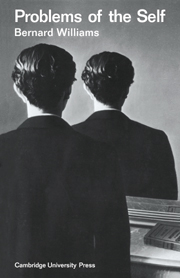Book contents
- Frontmatter
- Contents
- Dedication
- Preface
- 1 Personal identity and individuation
- 2 Bodily continuity and personal identity
- 3 Imagination and the self
- 4 The self and the future
- 5 Are persons bodies?
- 6 The Makropulos case: reflections on the tedium of immortality
- 7 Strawson on individuals
- 8 Knowledge and meaning in the philosophy of mind
- 9 Deciding to believe
- 10 Imperative inference
- 11 Ethical consistency
- 12 Consistency and realism
- 13 Morality and the emotions
- 14 The idea of equality
- 15 Egoism and altruism
- Bibliography
- Index of names
4 - The self and the future
Published online by Cambridge University Press: 07 December 2009
- Frontmatter
- Contents
- Dedication
- Preface
- 1 Personal identity and individuation
- 2 Bodily continuity and personal identity
- 3 Imagination and the self
- 4 The self and the future
- 5 Are persons bodies?
- 6 The Makropulos case: reflections on the tedium of immortality
- 7 Strawson on individuals
- 8 Knowledge and meaning in the philosophy of mind
- 9 Deciding to believe
- 10 Imperative inference
- 11 Ethical consistency
- 12 Consistency and realism
- 13 Morality and the emotions
- 14 The idea of equality
- 15 Egoism and altruism
- Bibliography
- Index of names
Summary
Suppose that there were some process to which two persons, A and B, could be subjected as a result of which they might be said – question-beggingly – to have exchanged bodies. That is to say – less question-beggingly – there is a certain human body which is such that when previously we were confronted with it, we were confronted with person A, certain utterances coming from it were expressive of memories of the past experiences of A, certain movements of it partly constituted the actions of A and were taken as expressive of the character of A, and so forth; but now, after the process is completed, utterances coming from this body are expressive of what seem to be just those memories which previously we identified as memories of the past experiences of B, its movements partly constitute actions expressive of the character of B, and so forth; and conversely with the other body.
There are certain important philosophical limitations on how such imaginary cases are to be constructed, and how they are to be taken when constructed in various ways. I shall mention two principal limitations, not in order to pursue them further here, but precisely in order to get them out of the way.
There are certain limitations, particularly with regard to character and mannerisms, to our ability to imagine such cases even in the most restricted sense of our being disposed to take the later performances of that body which was previously A's as expressive of B's character; if the previous A and B were extremely unlike one another both physically and psychologically, and if, say, in addition, they were of different sex, there might be grave difficulties in reading B's dispositions in any possible performances of A's body.
Information
- Type
- Chapter
- Information
- Problems of the SelfPhilosophical Papers 1956–1972, pp. 46 - 63Publisher: Cambridge University PressPrint publication year: 1973
Accessibility standard: Unknown
Why this information is here
This section outlines the accessibility features of this content - including support for screen readers, full keyboard navigation and high-contrast display options. This may not be relevant for you.Accessibility Information
- 19
- Cited by
